- Cooling area: 150 square feet
- Cooling capacity (BTUs): 5,000
- Cooling settings: 2
- Noise level: 52 dBA
- Dimensions: 16” W x 15.25” D x 12” H
- Warranty: 1-year limited
- Price on publish: $159
Best Window Air Conditioners: 10 AC Units That’ll Beat the Heat
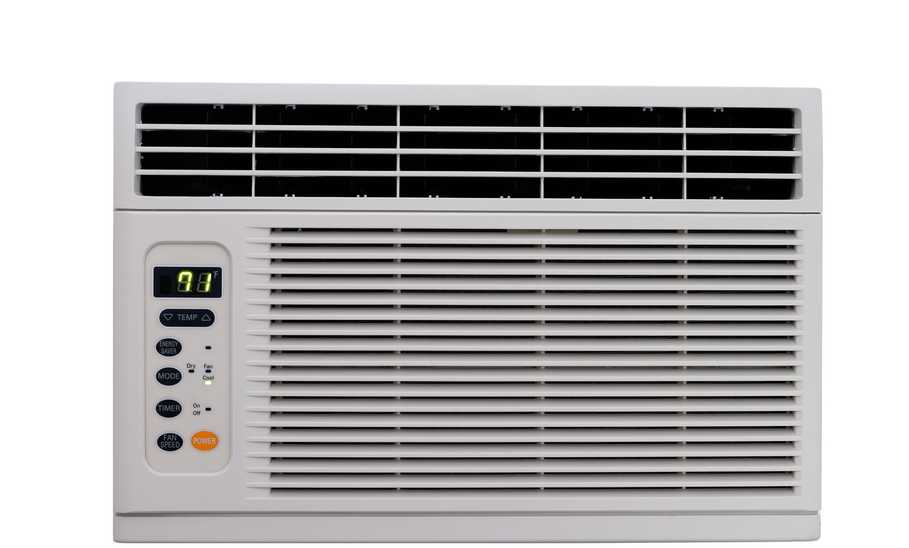
Our evaluations and opinions are not influenced by our advertising relationships, but we may earn a commission from our partners’ links. This content is created by TIME Stamped, under TIME’s direction and produced in accordance with TIME’s editorial guidelines and overseen by TIME’s editorial staff. Learn more about it.
I lived in Houston for a little over 10 years in the 1990s where most every house and apartment was equipped with at least two window units. If your house lacks a central cooling system, a window unit is an excellent choice for bringing some cool into your sometimes sweaty life. I currently live in NYC where, thanks to concrete, blacktop, and global warming, summers can be both oppressively hot and humid—yes, I have an AC unit perched in the window of my pre-war apartment.
The other trick to cooling your home (which is well known in southern states), is to install ceiling fans. “These will help cool you off and reduce the amount you use your AC,” said Traci Fournier, VP of Operations at One Hour Heating & Air Conditioning. On especially hot days though, no number of ceiling fans will combat the heat. To help you choose the best window air conditioner for your situation and budget, I consulted with Fournier as well as a couple other HVAC experts.
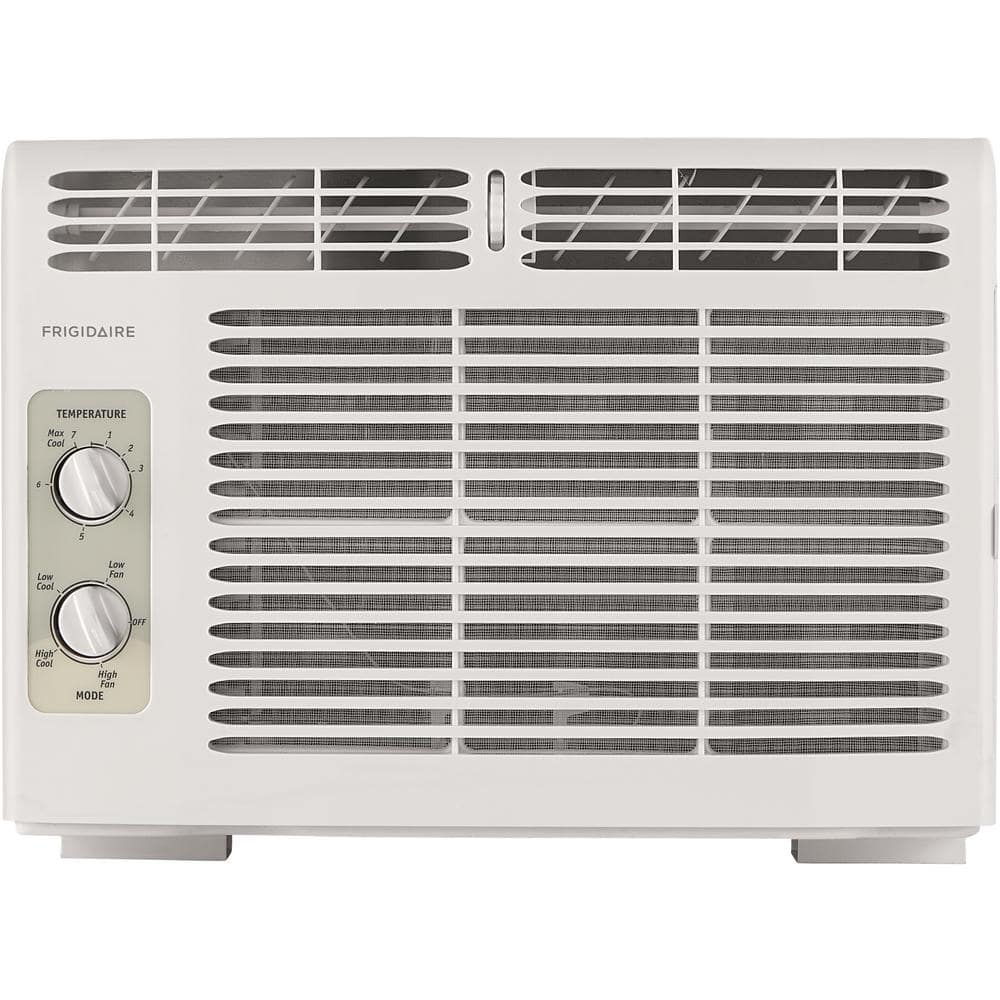
For an OG, no frills, budget-friendly window air conditioner, turn to this basic yet effective unit from Frigidaire. It features old school mechanical controls—which means you actually have to get up and walk to the air conditioner to change the settings—but with a price tag of only $159 it may be worth it (plus a little exercise never hurt anybody).
Like its comparatively small price, this unit works best in small spaces. It includes two cool settings, two fan speeds, and an easy to clean washable filter.

This saddle-style air conditioner from Soleus installs over your bottom window sill just as you’d put a saddle on a horse. (Please don’t put this AC on your horse, though.) This style is especially good for those who, perhaps remembering a pivotal scene in the show “The Good Place” (specifically, Chidi’s demise by a falling air conditioner), worry about air conditioner units plunging from their windows. It also leaves your window operational. Additional features include a digital programmable thermostat, remote control with ‘MyTemp’ sensor, and dehumidifier. It also auto-resumes after a power outage.
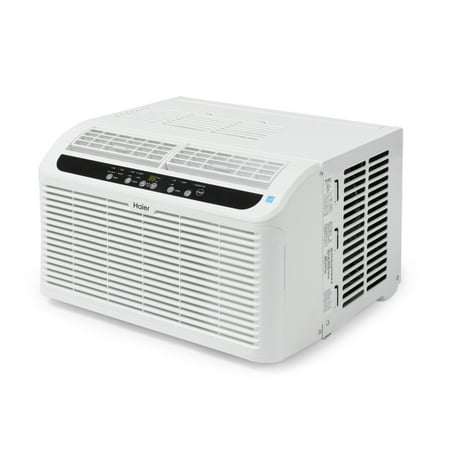
This unit works best in small rooms like a bedroom or home office. It features an electronic thermostat with digital display and remote control and slide out filter that’s easy to clean. Includes an EZ mount window kit for quick, pain-free installation. There’s also a dehumidifier mode, built-in timer and four-way air direction for optimal comfort and efficiency. One of the best things about it though is the internal compressor blanket which effectively dampens sound and vibration.
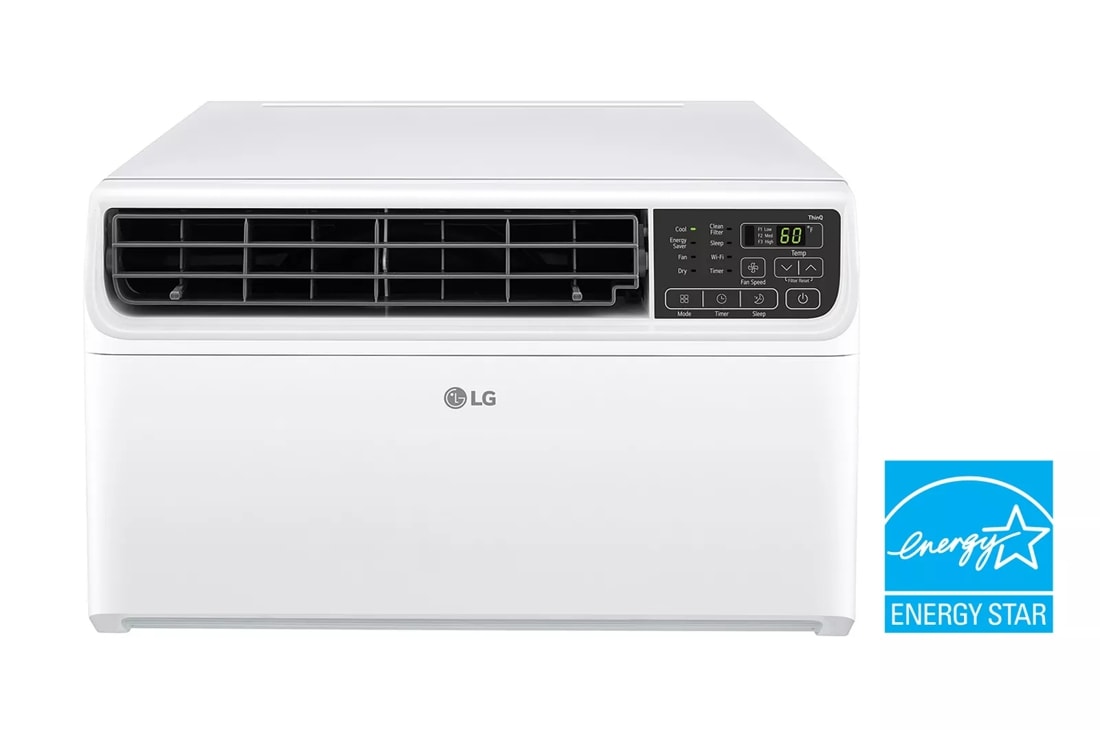
This smart, Wi-Fi equipped air conditioner from LG cools large spaces up to 800 square feet. The dual inverter compressor boasts energy efficiency as well as a quiet minimal noise level of 44 dBA (the unit’s BLDC, or brushless motor, contributes to this as well).
Features include a heat setting, energy saving function, timer, auto restart after power outage, four-way directional air, remote control, and smart features.
Perfect for casement style windows (those that slide side to side, not up and down) this air conditioner from Koldfront features a dehumidifier, digital display, and remote control. Energy saving settings include a check filter alert, sleep mode, and thermostat-controlled operation. In energy saver mode, the unit runs the fan for two minutes at 10-minute intervals until the ambient temperature reaches above your desired, programmed level, at which time the compressor will kick back in.

Wi-Fi enabled and smart home compatible (Alexa, Android, Google Assistant), this Windmill air conditioner features curved edges and an LED display that fades after 60 seconds, eliminating at least one source of blue light in your home. Unlike many other window units, the vents blow air up and out at a 45-degree angle (they’re located on top of the machine, instead of on the front).
There’s also a quiet operation setting that the company says runs nine times quieter than that of traditional units (which reviewers corroborate).
Requires the companion app to operate remotely.
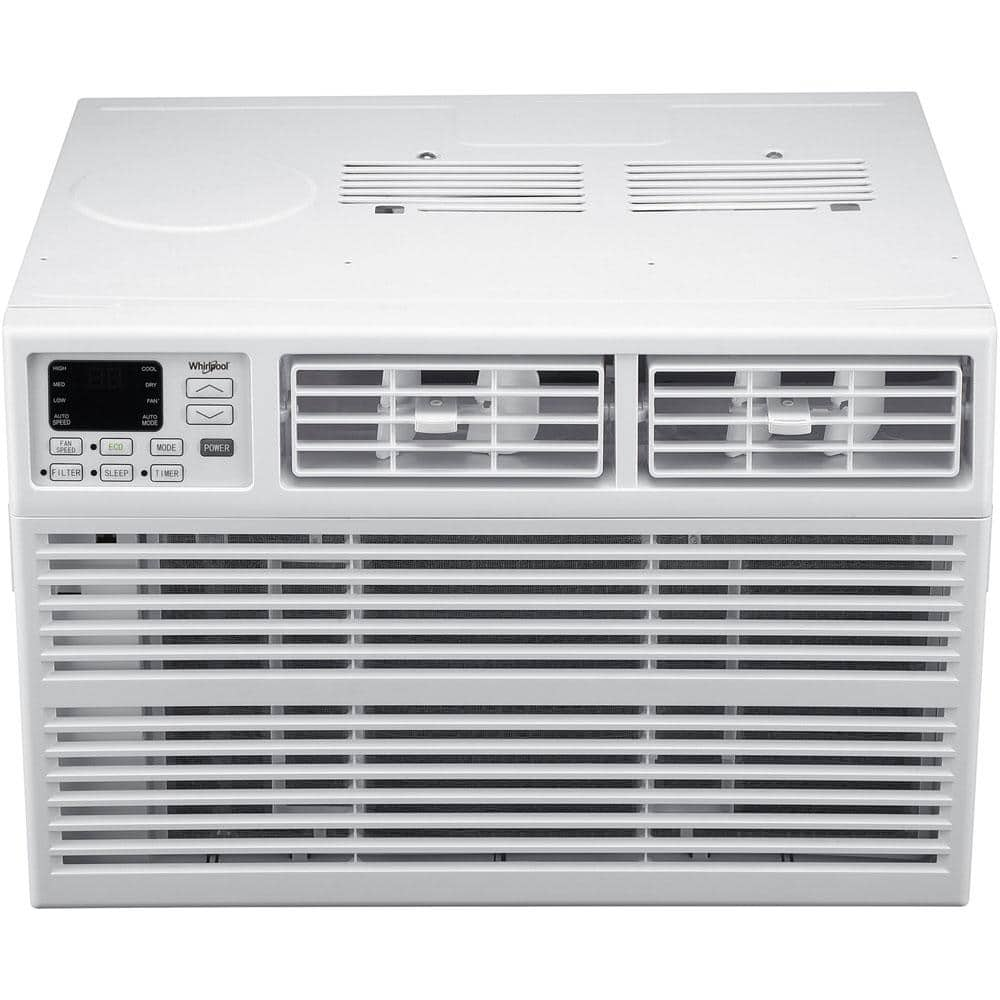
Featuring a 12.1 energy efficiency rating, this air conditioner from Whirlpool delivers reliable cooling while limiting its energy usage. A built-in dehumidifier removes up to 2.6 pints of moisture from your air every hour and the remote control allows you to manipulate the settings without leaving your couch or desk.
Engage the sleep mode and it gradually increases the room temperature as you slumber. In eco mode it cycles on and off to maintain your desired temperature.
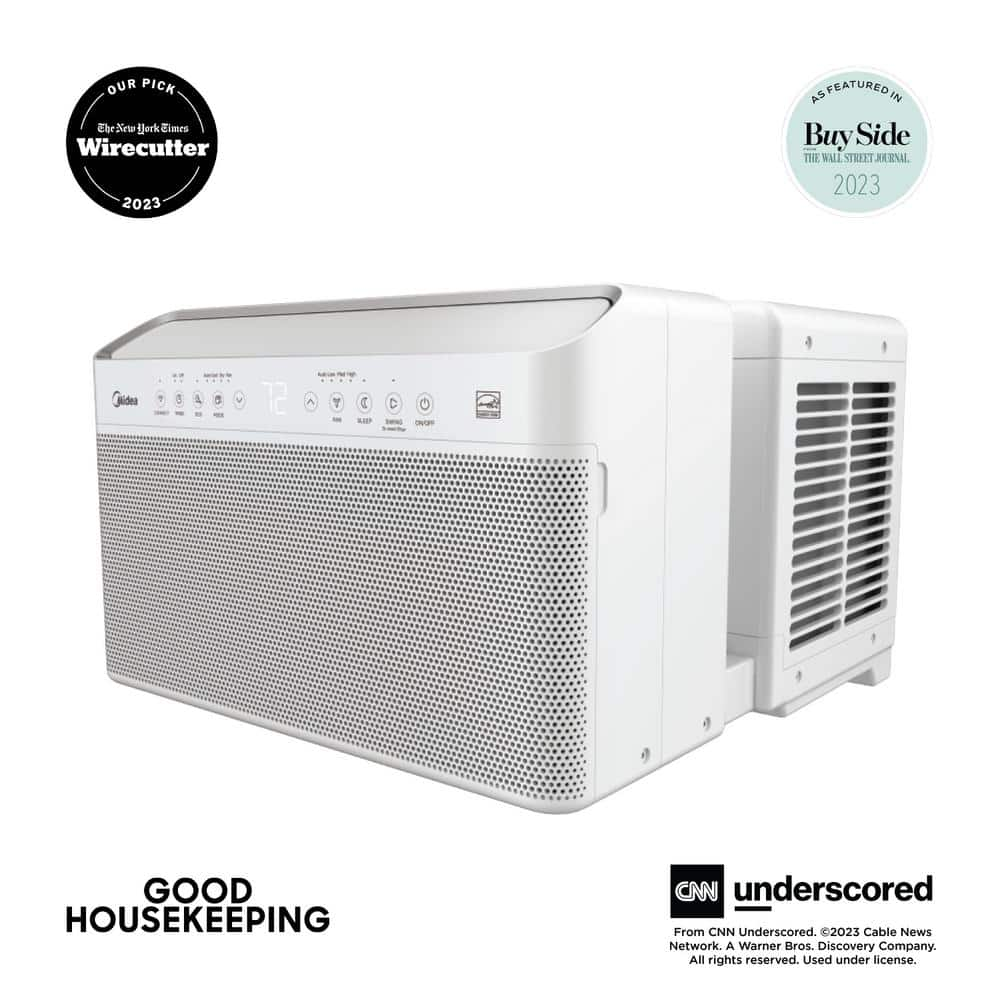
With a dBA rating of 32, the Midea u-shaped air conditioner is one of the quietest available. The U-shaped design installs over your window ledge, allowing normal operation of your window on days that don’t warrant an AC or whenever you need to let some fresh air inside (you know, when you accidentally burn the dinner you were heating up on the stove).
Both app and voice control options make controlling the Midea easy and the long-distance air flow reaches 20 feet. Plus, it received a 2024 energy efficiency certification from Energy Star.

Not only does this Frigidaire AC feature Wi-Fi and smart home capabilities, but it also includes a dehumidifier and a built-in air quality sensor so you can monitor your home’s air for allergens. The U-shaped design installs over your window sill and the louvers feature an auto swing option for more efficient cooling. Smart features work with Alexa, Android, iOS, and Google Assistant and the Frigidaire app. And it's Energy Star certified.

July window air conditioners stand out with their cover options (available in five different colors) and their included air purifier. Installation is easy with a frame that you position into your window first, then you slide the unit in where it locks into place.
The included app allows you to control the unit from anywhere. Wi-Fi enabled, July ACs also work with Alexa and Google Home. July also offers models for slider windows and through the wall installations.
I selected these air conditioners by researching companies, scouring online reviews and consulting with professional HVAC experts. I considered price, features, energy efficiency and warranty information to compile this list of the best window units for a range of applications and styles.
Purchasing the correct size AC is essential to getting the most out of it without wasting energy.
“AC units are anything but one-size-fits-all,” said Fournier.
According to Fournier, while an AC unit that is too big for your space may cool it down quickly, it consumes more energy than necessary. This will exert more wear and tear on the unit compared to an appropriately sized one. If a unit is too small for the room, it will run around the clock which, Fournier said, “drives up your energy bill while possibly never reaching your desired temperature.”
Window unit sizes are indicated via a BTU measurement (British Thermal Units). To find the correct BTU for your space, multiply the square footage by 20. This will give you a general estimate in the thousands, Glenn Wiseman, RASDT, RHDT, Sales Manager at Top Hat Home Comfort Services told me.
He reiterated the same caution about too big and too small air conditioner units as Fournier, adding also that if your AC cools an area quickly it can fail to properly dehumidify, meaning you’ll likely still have moisture in the air, making it uncomfortable.
Generally, Wiseman recommends 7,000 to 10,000 BTUs for small-sized rooms (150-300 square feet), 11,000 and 14,000 BTUs for medium-sized rooms (300-700 square feet), and 14,000 BTUs for larger rooms of 700 square feet or more.
Additional features to look for in window units include a dehumidifier setting, air purifying capabilities, and a heat setting. One of my apartments in Houston had a window AC that also included a heat function that came in quite handy when it was cold enough outside to warrant heat.
Many air conditioner brands offer window air conditioners that are now Wi-Fi and smart home compatible. If you like this level of technology, definitely look for one with those capabilities. It’s also nice to have programmable timer options and a remote control for ease of operation (or if you’re on the couch with a cat or dog in your lap and don’t want to disturb them in order to adjust the temperature).
While most homes have double hung windows that open up and down, some may feature casement styles that open from side to side. These each require a specific style of window AC made for that window type. If you’re considering one of the new u-shaped AC units (which has a notch between the front and back to slide window down) or saddle style AC units (which fit over the bottom of the window frame), make sure your window ledge is within the width requirements for that unit.
Things like how much direct sunlight your home receives as well as the number of doors and windows influences the efficiency of your air conditioning unit. Air conditioners receive an energy efficiency identifier measured in a SEER (Seasonal Energy Efficiency Ratio). The higher the number, the more efficient it is.
Also look for units that have an Energy Star award as the certification represents products that help you save energy, which is good for your pocket and the environment.
The price of a window AC unit varies with its BTU capacity. Wiseman told me, in general, a 6,000 BTU shouldn't cost you more than $300 for a new unit while the price of a 12,000 BTU will likely be closer to $500.
Usually, mini-split systems are more economical and can be helpful replacements for rooms that do not have windows, said Wiseman. Designed to mount high on the wall, a mini-split system helps circulate air evenly throughout the room. These are the kind of systems you find in many hotel rooms.
“They need to be installed on an outdoor wall in order to connect the refrigerant and condensate drain lines of the unit to an outdoor compressor and condenser,” said Wiseman. Most people enlist the help of an HVAC technician to ensure proper installation.
Window units, on the other hand, are self-contained and can be installed by homeowners. They’re a great solution for many homes, though ultimately a split system will likely be more energy efficient. If you rent or own an apartment in a prewar co-op building with all kinds of rules and restrictions (like me) a window air conditioning unit is probably your best solution.
“While a central air conditioning unit is more expensive initially than window or portable units—because of the high installation costs—it pays for itself over time by saving you on energy costs,” said Wiseman.
Central AC units are also more efficient than window units because they cool the entire house instead of just one room at a time, explained Wiseman. They use less electricity because they don't need to run as often as window units do when the weather gets warm outside.
“Some central air conditioners come with a variable-capacity operation that allows them to adjust their output based on how much cooling your house needs during different times of the year. If you do routine maintenance on them, they can be very inexpensive to keep up over a long period of time,” said Wiseman.
According to Fournier, window AC units typically last between 10 to 20 years, depending on how they are maintained. I can say from personal, anecdotal experience that some last even 30 years. They should be serviced once a year.
Expensive is, of course, relative. For me, having a cool home is important and worth the cost of the electricity.
“Depending on where you live and the watts used by the unit, the price varies a bit. The cost per hour is usually well under $1. For example, in Ontario, window units can run 12 hours a day in the summertime and only cost the user about $20 to $30 a month,” said Wiseman.
The information presented here is created by TIME Stamped and overseen by TIME editorial staff. To learn more, see our About Us page.



